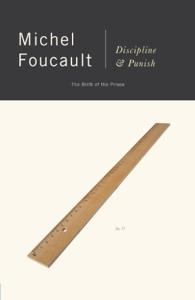
Want to learn the ideas in Discipline And Punish better than ever? Read the world’s #1 book summary of Discipline And Punish by Michel Foucault here.
Read a brief 1-Page Summary or watch video summaries curated by our expert team. Note: this book guide is not affiliated with or endorsed by the publisher or author, and we always encourage you to purchase and read the full book.
1-Page Summary of Discipline And Punish
Discipline and Punish is a history of the modern penal system. Foucault seeks to analyze punishment in its social context, and to examine how changing power relations affected punishment. He begins by analyzing the situation before the eighteenth century, when public execution and corporal punishment were key punishments, and torture was part of most criminal investigations. (Foucault)
During the eighteenth century, there were many calls for reform of punishment. The reformers wanted to make power more efficient and effective. They proposed a theater of punishment that would display various signs and symbols in order to relate punishments directly to crimes committed by prisoners, while also serving as an obstacle to lawbreaking.
The prison was not a common practice until the eighteenth century, when three new models of penality were introduced. These models helped to overcome resistance to it. However, there are still major differences between prisons and early cities that used physical punishment as a form of coercion. In order to develop the idea of the prison, disciplines such as timetables and military drills were created in order to control people’s movements and experience with space and time. This process is known as discipline. The aim of disciplinary power is to create individuals out of a mass by coercing their bodies through devices like timetables or exercise routines. Through observation, judgment, examination, normalizing judgment, human sciences (such as psychology) developed norms for behavior.
Disciplinary power is exemplified by the Panopticon, a building that shows how individuals can be supervised and controlled efficiently. Institutions modeled on the panopticon begin to spread throughout society. Prison develops from this idea of discipline. It aims both to deprive the individual of his freedom and to reform him. The penitentiary is next development in prisons, combining prison with workshops and hospitals for rehabilitation purposes.
The failure of prisons is often criticized, but that’s missing the point. The prison system was designed to fail and it succeeds in its goal of creating criminals. It is part of a network of power throughout society that creates delinquency as a way to control crime. Calls for abolishing the prison system are not recognizing how deeply entrenched it is within modern society or its true purpose.
Context
Background information
Paul-Michel Foucault was born on October 15, 1926 in Poitiers, France. His father was a doctor and he had a standard provincial upbringing. He attended the elite Ecole Normale Superieure (ENS) in Paris from 1946 to 1950 where he studied philosophy and psychology. During his time at ENS, he briefly belonged to the French Communist Party. While studying at ENS, Foucault observed clinics at Sainte Anne mental asylum. After graduating from ENS with degrees in philosophy and psychology, Foucault taught psychology at Lille University for two years before being transferred to Sweden as the head of the French cultural delegation to Uppsala University for six months during 1955 where he wrote much of his first major work Madness and Civilization. In 1956 Foucault went back to Poland then Hamburg until 1961 when he returned once again to France where he began teaching alongside Louis Althusser, Jacques Derrida, Gilles Deleuze, Jean Piaget, Claude Lévi-Strauss, Simone de Beauvoir and Maurice Merleau-Ponty.
Michel Foucault was born in 1926, and he became a philosophy professor at the University of Clermont-Ferrand from 1960. He joined Tel Quel’s editorial board in 1961 and wrote Madness and Civilization. In 1963, he published The Birth of the Clinic, which is about medicine; then in 1966, The Order of Things, which discusses how we categorize things; next came Archeology of Knowledge (1969), Discipline and Punish (1975), all three volumes of his History of Sexuality (1976); followed by Abnormal: Lectures at College de France 1974 – 1975 ; along with many other books on different topics.





